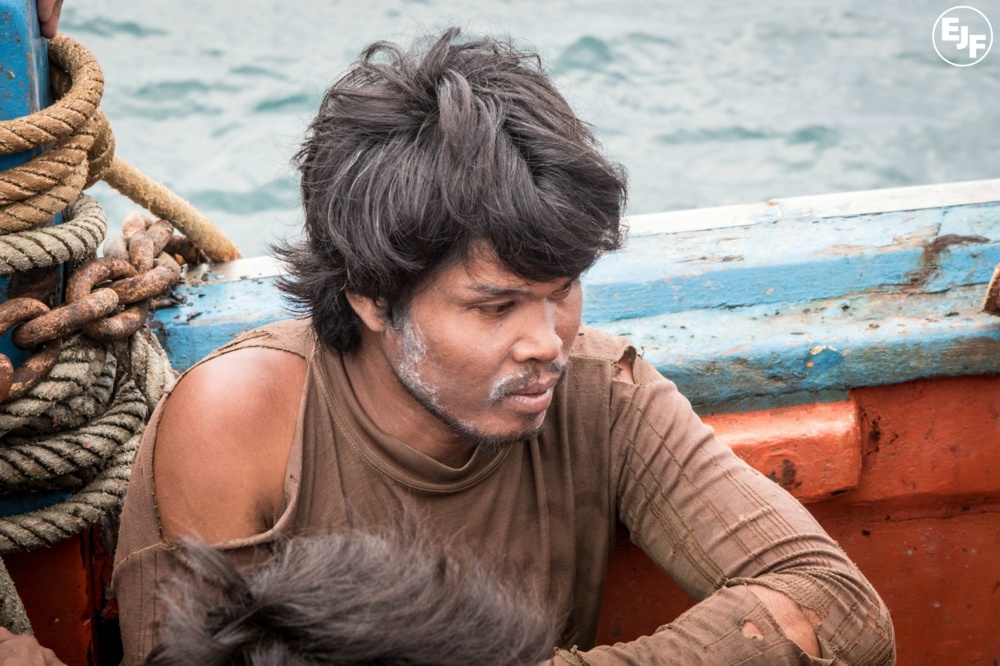
Thailand retained on US human trafficking watchlist for 4th consecutive year
The US State Department has retained Thailand on the Tier 2 Watchlist of its annual human trafficking index for the fourth year running, adding to fears that Thailand’s seafood exports continue to be linked to human trafficking, exploitation and murder.
The 2013 Trafficking in Persons (TIP) report, presented today by US Secretary of State John Kerry, reports that insufficient progress has been made by Thailand to tackle human trafficking, and that corruption, inadequate inspections and a lack of prosecution remain major problems.
Thailand has now been on the Tier 2 Watchlist for four years and faces an automatic downgrade to Tier 3 if significant improvements are not made in the coming year. One particular area of concern raised by the TIP report was Thailand's failure to prosecute and convict trafficking offenders, with only 27 prosecutions in 2012, compared with 67 in 2011. Of the 27 prosecutions initiated in 2012, only 10 resulted in convictions. The reduction in prosecutions comes in spite of a significant increase in investigations, from 83 in 2011 to 305 in 2012.
The Environmental Justice Foundation (EJF) has been meeting with the US State Department this week to highlight the findings of its investigations in to human trafficking to supply labour for the seafood industry in Thailand. In a report released last month, the EJF revealed evidence of human trafficking, labour abuse and the routine use of violence, including murder, in the Thai seafood industry. Thailand’s seafood industry employs more than 650,000 people with exports totaling $7.3 billion in 20
Sold to the Sea: Human Trafficking in Thailand’s Fishing Industry features testimonies of Burmese workers, as young as 16, who were trafficked in to Thailand and forced on to fishing vessels. Until their rescue months later, they were subjected to arduous, often violent, working conditions without pay. Two of the rescued men reported witnessing multiple murders at the hands of traffickers, including one worker who had weights tied to him, before being thrown overboard.
EJF’s 2013 investigations also revealed the involvement of local police, with trafficking workers forced to work unpaid on a rubber plantation belonging to a police official when they returned to port, and to paint the cells of a police station. EJF documented the boat owner who ‘bought’ the workers attempting to bribe them not to disclose him or his company in a forthcoming court case.
Such official collusion was also highlighted in the TIP report, saying that corruption remained widespread and citing "credible reports that corrupt officials protected brothels, other commercial sex venues, and seafood and sweatshop facilities from raids and inspections, colluded with traffickers, used information from victim testimony to weaken cases, and engaged in commercial sex acts with child trafficking victims."
On the day the US State Department TIP Report again ranked Thailand on the Tier 2 Watchlist, under the criteria of “making significant efforts to bring itself into compliance with minimum standards”, EJF highlighted one of the testimonies in their Sold to the Sea report from a victim of human trafficking in Thailand.
"The one who was tied up at a tree was called Mg Nge. They killed him because he helped others to run away. He was taken into a room and they tortured him, by kicking, punching and beating. Then he was taken outside and tied up at tree. One of the followers of Ko Myo climbed up the tree and took out a nest of big fire ants from a branch and placed this nest over Mg Nge’s body. Then they went back inside the room and left Mg Nge under the sun. They drank beer and when they got drunk, they came out again. Ko Myo cut Mg Nge’s belly by using a knife. After that, Ko Myo burnt his pen and dripped hot pen over Mg Nge’s wound. I did not want to see any longer so I lay down on my bed. They took Mg Nge back inside the room and placed him beside me. I noticed that he was dead. When it went dark, they put Mg Nge’s body in a black bag and took outside."
EJF is calling for urgent action from the Thai Government and seafood supply chain to rid Thailand’s fisheries sector of human trafficking and human rights abuses.
“Whilst we welcome the rejection of an upgrade in Thailand’s status by the US State Department, there is clearly a huge amount of work for Thailand and seafood companies to do. EJF has uncovered the consistent, wide ranging use of forced and trafficked workers on Thai fishing boats as a way to maximise profits. The fish caught by these vessels, crewed by trafficked workers, is used to supply fish to the shrimp industry and provide for fish markets in Europe and the United States. Thailand needs to address this issue head on, by rooting out corruption, prosecuting offending boat owners and companies, and ensuring a rigorous inspection regime. Meanwhile seafood businesses need to urgently investigate their supply chains to ensure that no products linked to human trafficking are present.
At a global level, we are calling for the development of a Global Record of fishing vessels, and the ratification of the International Labour Organisation (ILO) Work in Fishing Convention. Both of these measures are absolutely essential in ensuring the transparency and traceability necessary to identify and end modern-day slavery in the fishing industry.” Steve Trent, Executive Director of EJF
The US State Department 2013 TIP Report can be found in full here.
SIGN UP FOR OUR EMAILS AND STAY UP TO DATE WITH EJF